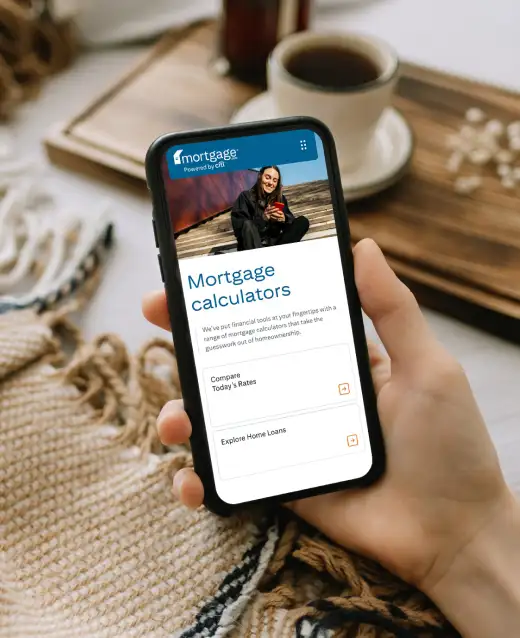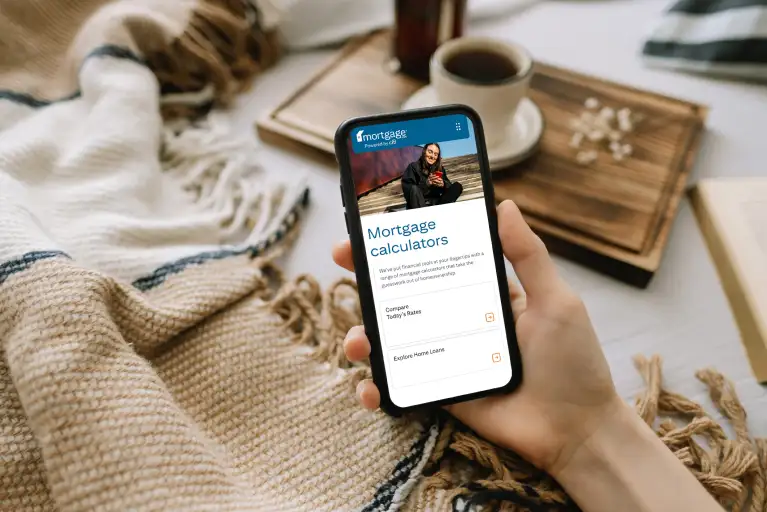Breaking down the cost of buying a home
So, how much does it cost to buy a house? Hint: There’s a lot more to the story than the price listed on the for-sale sign.
Tucking part of your paycheck away each month will certainly move you closer to your goals, but understanding the breakdown of all expenses involved will help you predict how much you’ll need to get started.
1. Earnest money
An earnest money deposit is typically 1% to 2% of the home's purchase price and is paid to the seller upfront as part of the initial agreement to purchase the home. While not always mandatory, making this deposit is a common practice that can help you stand out in a competitive market. When you close on the home, this deposit goes towards your down payment.
2. Down payment
Ah, the almighty down payment. While 20% of the purchase price is the standard on conventional home loans, there are options for lower down payments if you're not quite there yet, including:
- FHA loans: Loans insured by the Federal Housing Administration often require a down payment of 3.5% of the purchase price, which can be a real help to first-time home buyers and those with lower credit scores.
- VA loans: Loans guaranteed by the Department of Veterans Affairs, which are available to eligible veterans, active-duty service members and their spouses typically do not require a down payment, making them an attractive option for those who qualify.
- Conventional loans: A lot of lenders provide conventional mortgage loans even if you don't have a 20% down payment ready. However, there's a catch: you'll need to pay for monthly mortgage insurance. This extra cost is tacked onto your regular mortgage payment. It's essentially a safety net for the lender in case you're unable to continue making your mortgage payments. The good news is that you won't have to pay this insurance forever. It usually ends once your remaining loan balance drops to 80% of your home's value.
- USDA loans: Loans guaranteed by the U.S. Department of Agriculture are available to eligible borrowers purchasing homes in designated rural areas and typically do not require a down payment.
- Local assistance programs: Some state and local government programs, as well as nonprofit organizations, offer help to home buyers with limited financial resources including grants, low-interest loans or other forms of assistance to help cover all or part of the down payment.
3. Closing costs
Closing costs are essentially the final fees you pay to wrap up the purchase of your home. They come into play when you're signing all the loan documents and officially closing the deal. These costs cover a variety of things like loan origination fees, legal fees, title searches, loan processing charges, recording fees, and other services needed to finalize the transaction.
You should get a heads-up about these fees when you're pre-approved for a mortgage, but you’ll always get a full overview of your closing costs when you officially apply and receive your Loan Estimate. It's really important to include these costs in your budgeting plans. That way, you're all set and not caught off guard when it's time to sign on the dotted line and make everything official.
4. Cash reserves
Cash reserves refer to the cash you’ll have on hand after you've handled the down payment and closing costs. For a single-family home, it's a good idea to keep reserves of 2 to 3 months' worth of your estimated monthly payment of Principal, Interest, Taxes and Insurance (PITI). In some circumstances, for example when buying a 2 to 4-unit second home or investment property, you may want to anticipate having 6 months' worth cash reserves. This is super-important for three reasons:
- Lender assurance: Many lenders require buyers to have a certain amount of cash in reserves to ensure they can continue to make their mortgage payments.
- Emergency buffer: Buying a home can come with some surprise expenses such as repairs or maintenance issues that were not apparent during the initial inspection. We see you, creaky hot water heater! Having cash reserves means you’re prepared to handle these expenses without too much pressure on your wallet.
- Market leverage: In competitive housing markets, showing that you have substantial cash reserves can make you a more attractive buyer. Sellers often prefer buyers who appear financially stable and capable of closing the deal without issues.
5. Prepaid costs
When you're buying a home, these are the fees you pay to cover things like property taxes, homeowners insurance and interest that has become due before your first mortgage payment. Closing costs are paid directly to the service providers at the time of closing, like the realtor or lawyer. Prepaids, on the other hand, are held by your lender in an escrow account and are used to pay future bills like taxes and insurance.
6. Monthly mortgage payments
When you apply for a mortgage, you'll receive a Loan Estimate that breaks down your monthly mortgage payment. This payment typically covers three main areas:
- Principal: This portion goes towards paying down the amount you originally borrowed.
- Interest: This is the cost you pay for borrowing the money.
- Escrow: This part is often used to accumulate funds for property taxes and homeowners insurance.
It's important to note that while lenders might require you to use an escrow account for property taxes, it's not mandatory for homeowners insurance. You might find it convenient, however, to include your insurance payments in your monthly mortgage payment to simplify your finances.
Keep in mind that the need for an escrow account can vary. For example, in some places like California, it's quite common for consumers not to escrow for taxes or insurance unless it's specifically required by the loan terms.
Got your sights set on a home?
Use our Mortgage Calculator to figure out your estimated monthly mortgage payment.
7. Additional homeownership expenses
Now, let’s talk about all those other possible costs that may or may not come into play with this big life transaction. One is Homeowners Association (HOA) fees. Depending on your property, you may have something called a Homeowners Association which charges a monthly or annual fee if your property is part of a shared community. This association is typically a group that manages the common areas like parks, landscaping and gyms. These fees can typically run anywhere from $100 to $1,000 a month. It could be even more if your planned community has those fancier amenities like a pool or a community clubhouse.
Wondering if the property you’re eyeing has an HOA? You can get all this info and more from your real estate agent or by conducting a public search through the city or county tax collector's office. Just pop the address in and you’ll get an idea of the property taxes for that home.
It’s also wise to set aside an emergency fund for the occasional surprise, like unexpected maintenance or repairs.
Pro Tip
When house hunting, ask your realtor about the monthly or annual HOA fees, review the HOA's budget and check how the assessments have increased over the years.
8. Moving costs
Last, but most definitely not least, remember to factor in moving costs. These can vary widely depending on the distance of your move and how many boxes you’re hauling—which always seem to multiply once everything's all packed up and ready to load in the truck! But whether you're moving across town or across the country, you'll need to budget accordingly. Naturally, professional movers cost more, but if you’re going the DIY route, factor in the costs of your moving truck, fuel, packing supplies and additional insurance. And remember, pizza and gratitude are the universal currency for friends who pitch in.
How to prep your budget for buying a house
Now that you know everything that goes into buying a home, it’s time to prepare your budget for buying one. Follow these essential steps to stay ahead of the game that is home buying!
1. Monitor your credit score
Always check your credit score! The easiest way to keep on top of it is through your bank—they’ll often post your score as part of your online account. Knowing your score is key because it will affect the interest rates you'll be offered when you’re looking for a home loan. A higher credit score can lead to better loan interest rates, which can save you money over time. Check your credit report regularly, settle those credit card bills and keep an eye on any irregularities. When it comes to crunch time, a glowing credit score will be your greatest asset.
Pro Tip
Did you know you have free weekly access to credit reports using the government-mandated site, AnnualCreditReport.com? It's the fastest method, but you can also request your reports via phone or mail if needed.
2. Establish a budget
Figuring out how much you can afford is a pretty good place to start when it comes to buying a home. Start by adding up your monthly income from all sources. Then, jot down your fixed expenses like rent and car payments, and don't forget to estimate your variable costs such as credit card bills, groceries and utilities. These can add up to quite a bit!
If you need help crunching all the numbers, try using our affordability calculator and let it do all the hard work for you.
3. Save for a down payment
The larger your down payment, the smaller your mortgage loan will be. Start saving early to build up a substantial down payment. This can also help you secure better loan terms and potentially avoid private mortgage insurance (PMI), which can add to your monthly expenses.
4. Pay off debt
Reducing your debt not only helps improve your credit score, but also lowers your debt-to-income ratio, which lenders look at when considering your loan application. Paying off high-interest debts, like credit card balances, can free up more of your income for your monthly mortgage payment.
5. Get pre-approved for a loan
Getting pre-approved before speaking to a real estate agent can save you time, money and frustration. Navigating money matters can be intimidating, but with the right experts by your side and a clear vision of the goal ahead, you'll be unlocking the door to your new home before you know it.
Ready to get pre-approved?
Consider an option like the Citi SureStart® Pre-Approval program, which offers a firm loan commitment for approved borrowers.







